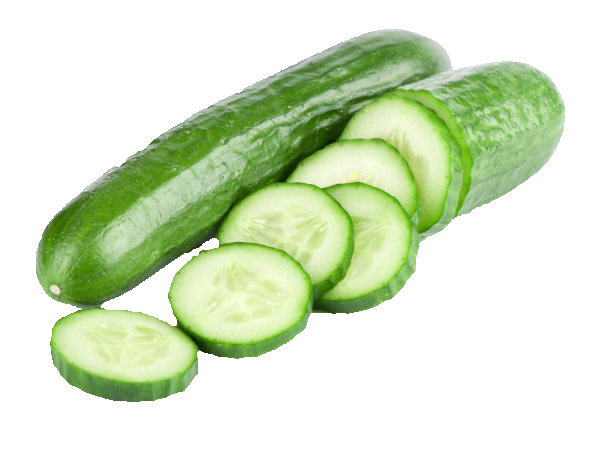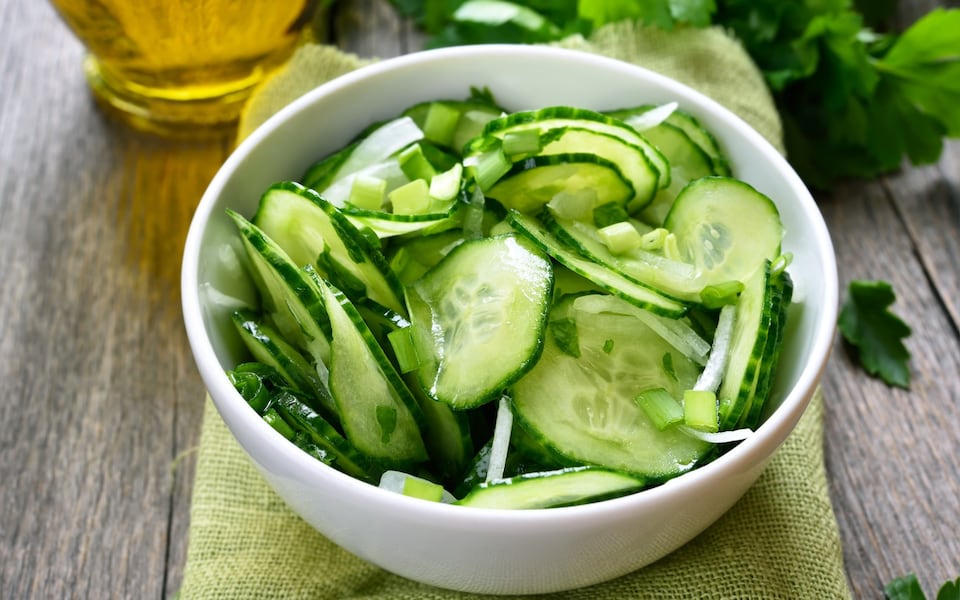on the 1081
Why you should be adding more cucumber to your diet
In a Greek salad or in a Pimm’s, cucumber is more than just a staple summer vegetable. Here are their key health benefits

Whether it’s a chunky slice in a glass of Pimm’s, a handful grated into a tzatziki or cubed in a Greek salad, cucumber is a summer staple. They’re hydrating, delicious and cost less than £1.
But the benefits don’t stop there. They’re full of vitamins that support skin health, antioxidants that support heart health and are very low in calories. Dr Sarah Brewer, a nutritionist and author, has shared why cucumbers should be a staple in all fridges.
Are cucumbers hydrating?
Yes. First off, they have a very high water content. Each 100g of cucumber (around a 6cm piece) contains 96g of water, says Dr Brewer. As well as being hydrating, this also makes them a great low-calorie food. A 6cm wedge contains just 10 calories and 1.2g of sugar, meaning they would not spike blood sugar levels.
Do they have a range of vitamins and minerals?
“Cucumbers provide potassium, which flushes excess sodium and fluid from the body,” she explains. “They also contain magnesium (muscle and nerve function and fights fatigue), vitamin C (needed for healthy gums and skin) and vitamin K (involved in blood clotting and when applied to the skin can reduce thread veins and bruising).”
What antioxidants do cucumbers contain?
Cucumbers contain may antioxidants including:
- Vitamin C
- Vitamin K
- Magnesium
- Potassium
- Calcium
- Beta-carotene
- Lignans
Antioxidants switch off molecules called free radicals, which float around in our body, causing damage to our DNA and fuelling diseases.
“Cucumbers contain several antioxidant polyphenols,” Dr Brewer says. These include lignans (which have been linked to a lower risk of cardiovascular disease and some cancers) and beta-carotene (known to boost the immune system, as well as eye and skin health).
Do cucumbers help ward off illnesses?
Cucumbers are also a source of cucurbitacin B, a compound which is thought to protect against inflammatory and neurodegenerative diseases, cancer and Type 2 diabetes, Dr Brewer says.
However, studies into cucurbitacin B have looked at the effect of the compound when isolated, so eating a few slices of cucumber is unlikely to overhaul health, she adds.

Will eating them boost hair, skin and nail health?
Placing two slices of cucumber over the eyes is more than just an old wives tale – they do actually soothe puffy eyes, Dr Brewer says. Cucumbers can also be used on the skin as after-sun treatment for sunburn (though only as a last resort, as people should wear sun cream to avoid this), she says.
“Also, cucumber rind is one of the richest food sources of silica – a mineral that plays an important role in maintaining healthy hair, skin and nails,” Dr Brewer notes.
“Silica is present in such high concentrations to protect cucumbers from powdery mildew, to which its high water content makes it susceptible.”
Are they full of nutrients?
Compared to other fruit and vegetables, Dr Brewer says cucumbers “are not a nutritional powerhouse”. While they are a source of vitamins and minerals, their high water content means they lack the nutrient density of other vegetables.
“Don’t rely on cucumbers to correct any nutritional deficiencies,” she says. Cruciferous vegetables like broccoli, kale and Brussels sprouts offer more bang for your buck.
Can they cause allergic reactions?
“A few people are allergic to cucumber proteins,” Dr Brewer notes. “Patch test a small area of skin by applying a cucumber ring for 15 minutes to ensure there is no reddening or itching,” she recommends.
What are the most nutritious ways to eat them?
Cucumbers are best eaten raw, so salads are a healthy option, as is adding them to wraps and sandwiches.
Keep some tips in mind to gain the most from cucumbers: avoid preparing them too far in advance (causes vitamins to degrade), do not peel off the skin (removes fibre, silica and other minerals) and resist scraping out the centre (reduces the water and fibre content).
Smoothies are another option. Blitz half a chopped cucumber with 250ml of coconut water, a sprig of mint, one peeled kiwi and a few spinach leaves, Dr Brewer recommends. “This releases the water content to bulk up the other fruits and vegetables being used,” she says.
Simply adding cucumber to water will not provide much nutritional benefit, but can help with keeping hydrated, if you like the taste, she says.
To enjoy them as a snack, slice and top with cheese, creme fraiche and salmon or avocado, or even just freshly ground black pepper, Dr Brewer suggests. Or cut lengthways and dip into hummus.
Fermenting or pickling cucumbers can benefit the gut microbiome, though the cucumbers used in these recipes tend to be smaller and have thinner skins (meaning less fibre and silica than the normal variety), she notes.
FAQs
Are cucumbers healthier than tomatoes?
Both cucumbers and tomatoes are healthy, but offer different health benefits. Cucumbers contain twice the amount of vitamin K (which helps with blood clotting and bone health) than tomatoes, though tomatoes are far higher in vitamin C (which supports the immune system and collagen production).
Is it safe to eat cucumber every day?
For most people, it’s safe to eat cucumber every day. However, the high water and fibre content could cause digestive problems if eaten in excess.
